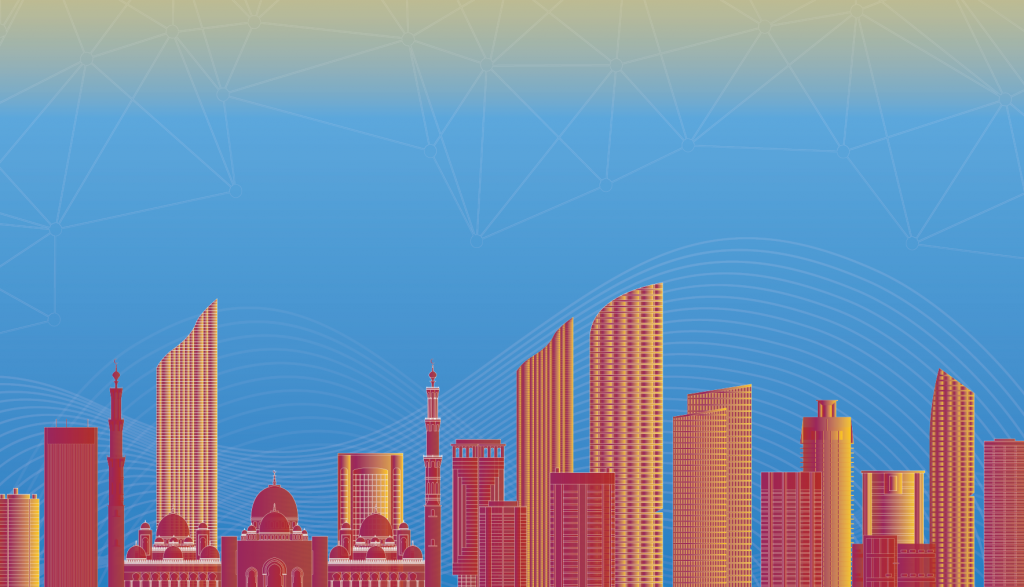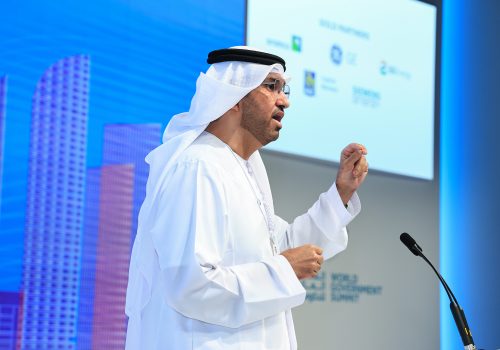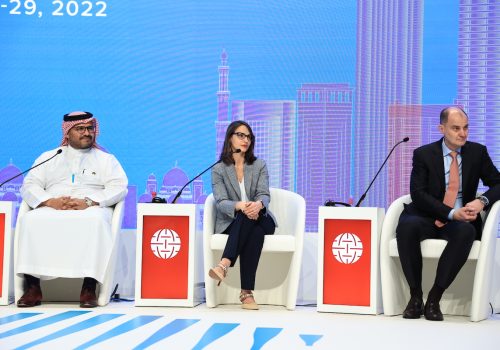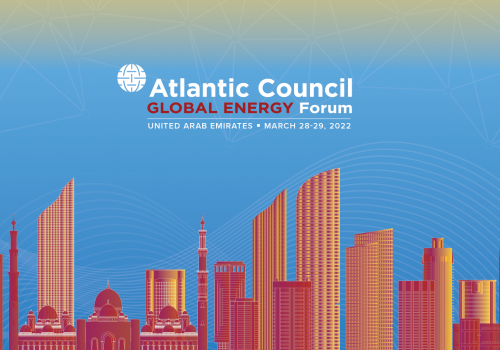Watch the full event
Event transcript
Uncorrected transcript: Check against delivery
Speakers
H.E. Wavel Ramkalawan
President, Republic of Seychelles
H.E. Gaston Browne
Prime Minister, Antigua and Barbuda
H.E. Aiminth Shauna
Minister of Environment, Climate Change & Technology, Maldives
Moderator
Eleni Giokos, Anchor and Correspondent, CNN
ELENI GIOKOS: Thank you so much. A very good morning to all of you. Fantastic to be with you today.
My name is Eleni Giokos. I’m an anchor and correspondent at CNN. And we’re here to discuss one of the most vital topics not only facing humanity, but also ensuring that even during times of unprecedented crises that might come unknowingly we still have to focus on climate change and the agenda at hand.
We know that last year we spoke about red alert, the incredible urgency to ensure that we don’t take our eye off the ball when it comes to the devastating effects on climate change. And importantly, it’s the most vulnerable communities around the world that are bearing the brunt, most of which have not industrialized yet. And yet, they have to be at the forefront of renewable energy, of decarbonization, and they’re paying an enormous price.
So the question is: Where to from here as we start to divert attention to security issues, for example, geopolitical issues, the concerns about food insecurity and inflation that has now hit most people’s shores?
I’d like to now welcome our guests.
His Excellency Wavel Ramkalawan, the president of the Republic of Seychelles. Please come onstage. A round of applause for His Excellency.
His Excellency Gaston Browne, prime minister of Antigua and Barbuda. Thank you so much.
And Her Excellency Aminath Shauna, minister of environment, climate change, and technology at Maldives.
Welcome. Fantastic to have you with us. I’m really delighted that you could make it today and give us a sense of why we are still in the middle of a devastating situation when it comes to climate change, and all of you are at the coalface. You’re at the forefront of the impact and effects.
I’d like to cast our minds back to a pledge that was made over a decade ago that richer and wealthier nations that are industrialized would be spending over $100 billion in investing in smaller and developing economies to help with the energy transition. And the question is, has that been done? We know that after COP we realized that a lot of the money that was put on the table never really materialized.
So I’d like to start with you, Your Excellency. Seychelles has been very vocal about the impacts, about what this means for your future, and I want you to give me an idea of where we stand today. You know, after Glasgow, lots of pledges and lots of things being sort of signed. Are you seeing anything moving the needle right now?
PRESIDENT WAVEL RAMKALAWAN: Thank you very much. The answer is no. We are still living in high hopes that the pledges will be—will be accomplished. But unfortunately, well, we had Paris, then Glasgow, and the commitments keep being reinforced but, unfortunately, the results are not forthcoming.
And it is very important to note that as a small island developing state or as an oceanic state, we depend on others to help us. And one of the reasons—one of the reasons being that when you’re talking of climate change, we are not—we are not really damaging the planet. On the contrary, our emissions are low and it’s the industrialized nations that are doing all the harm. But on the other hand, we find ourselves mitigating the climate change. We find ourselves giving. And it’s always giving, but when it’s time to receive in order to protect our very—to protect ourselves—and when we say protection, we mean our very survival; I mean the masses that are being destroyed, the islands that are—that will soon no longer be. So we are a bit disappointed, to say—to put it mildly, very disappointed to put it the way it should be said, that the commitments are not –
ELENI GIOKOS: Are you angry? Are you angry that you’re not seeing that commitment on the table?
PRESIDENT WAVEL RAMKALAWAN: Oh, obviously, the anger—the anger is there because with all the—with all the talk, with all the loud speeches and everything else, but when you compare the reality –
ELENI GIOKOS: Yeah.
PRESIDENT WAVEL RAMKALAWAN:—it’s a totally different story.
ELENI GIOKOS: Prime Minister Browne, you have said that COP is just a PR exercise and it doesn’t really amount to anything on the ground. And I mentioned this—I alluded to this in the intro—that we had a red alert. We know that we’re in trouble. And yet, now we again are sitting with another crisis—other crisis that could divert attention. Do you think we’re going to take our eye off the ball here?
PRIME MINISTER GASTON BROWNE: Well, we have to remain resolute that climate change, which is the most significant existential threat facing the planet, that it remains at the forefront and that we continue to advocate for the phasing out of fossil fuels and for us to reduce global temperatures below 1.5 degrees in order to protect human civilization. There is no other priority. In fact, on the current trajectory we are literally facing a situation in which global temperatures could rise about 2.7 degrees, and at that point we could lose a significant portion of our biodiversity and human civilization globally would be impacted.
Unfortunately, small island states like Antigua and Barbuda, the Seychelles, and certainly Maldives and others, we are on the frontlines. So we will be the first to go, but certainly others will follow. So notwithstanding the current instability of the situation with petroleum shortages and so on, we have to remain very resolute in our ambition to cut emissions and to control global temperatures in order not to imperil human civilization.
ELENI GIOKOS: Minister Shauna, we have spoken before and we actually spoke ahead of Glasgow last year. We’re heading to COP in Egypt and we’re hoping to see again some kind of commitment. Some people are feeling very disheartened in terms of what we’re going to be facing in the next year in terms of global instability. We have heard the energy security issue could mean that Europe might need to fire up old coal-fired powerplants, yet it’s accelerating the move towards renewables which will take some time. How are you reading into this situation?
MINISTER AMINATH SHAUNA: Thank you for having the frontline states in a conference such as this.
The Maldives, Seychelles, Antigua and Barbuda, we are all frontline states. And just months after COP-26, where we made incremental progress, we saw the report by the IPCC. AR6 was released and, unfortunately, it did not get the attention it deserved. And it very clearly states that unless we are able to keep global temperatures within 1.5 [degrees], countries like the Seychelles, Antigua and Barbuda, the Maldives, we are going to find it extremely challenging to continue to live in our island nations.
We are very large ocean states, and even in the Maldives we have observed at least about 4.5 inches of sea-level rise. We have observed 1.1 degrees of temperature increases in the Maldives. Our survival, our food, our revenue all depends on ocean resources. If we continue to emit as business as usual, we might—it’s not just us. We are all in this together. It’s not just small island states, but Europe is already experiencing extreme weather events, floods, and they will continue to experience these changes as well. But we are frontline states, so see us as just the first wave of the impacts of it. But it’s coming to everyone, all of us.
ELENI GIOKOS: And this is a big conversation. You know, you’ve got to focus on industrialization, specifically for developing economies that haven’t had the chance to industrialize so therefore they haven’t been the biggest contributors to what we’re seeing right now. So when you have a country that has an abundance of coal, the question is, what does it do? Does it burn it or not? A question was posed to the minister of energy from Saudi Arabia and we heard his answer that he is pro using coal and any fossil fuel that might be available to any country. Mr. President, what’s your reaction to that?
PRESIDENT WAVEL RAMKALAWAN: Well, I must say I was rather surprised to hear such a statement because the world is talking about moving away from fossil fuel and especially burning coal, which is—which is known as the biggest contributor towards the negative effects of climate change.
You see, when such statements are made and when we are also at the same time pushing towards moving to sustainability and away from fossil fuel, we the small island states find ourselves in very difficult situations because not only we don’t have the landmass—I mean, when you—when you compare the three countries that we are talking of, Seychelles is just over 460 kilometers square, Barbuda just under. This morning I realized that we were even smaller than—well, you are smaller than us.
PRIME MINISTER GASTON BROWNE: Right.
PRESIDENT WAVEL RAMKALAWAN: And the Maldives—I mean, we don’t have the—we don’t have the landmass. And yet, we are the ones putting environment protection to the fore, and we are also being pushed to move towards using alternative sources of energy. And this costs a lot. So when those who are in the forefront of using fossil fuel make such statements, then we ask ourselves: What we are supposed to be doing?
And there, again, this is—this is where we go back to us working together as a planet. There’s only one planet. There’s only one planet, and it’s not good for one part to be saying something and for another part to be saying something else.
ELENI GIOKOS: And I have to say, you know, when we look at, for example, Africa, that still desperately needs to industrialize and it’s sitting with a very bad dilemma of having availability of fossil fuels, for example, and yet being put into sort of the same category as everyone else in the world—well, we all have to drop emissions by a certain percentage—Prime Minister, do you think that the richer countries, the countries that have fossil fuels that have industrialized for a long time, should be reducing emissions far more aggressively and still allowing economic development for the countries that need it most? Or do you think we are all in this together, we all have to be aggressive, there is no room to play around with?
PRIME MINISTER GASTON BROWNE: Well, you know, this threat is so significant that it requires an all-of-society approach. And it requires the commitment of all countries large and small, especially the industrialized countries, to reduce emissions and to help developing countries to transition away from the use of fossil-fuel energy and to adopt the new green-energy technologies. This is important, ultimately, to protect human civilization.
And I believe, too, that there are some who are putting, let’s say, livelihoods ahead of protecting lives. Now, clearly, if you’re not alive, they will not be able to protect the economy. So putting the economy ahead of the lives of individuals, I think that the priority is wrong and that ultimately you must understand the threat of climate change, that it represents the most significant threat to humanity and it must be given significant priority. All of the necessary resources should be made available to ensure that the transition can take place in an ordinary manner.
We’re not suggesting that we just transition overnight into fossil fuels—into green energy from fossil fuels. We recognize it will take time, but what is required at this point is greater commitment. I mean, evidently industrialized countries continue to game the system. They make pledges. They do not honor their pledges. We need to see greater commitment and we need to have a situation in which we put our common humanity above economies.
ELENI GIOKOS: Minister Shauna, why do you think we haven’t seen this commitment materialize into action and implementation by the wealthier nations? Can you hear me? Can’t hear me? I think my mic is failing. OK. Why do you think that we can’t—we haven’t seen the commitment made by wealthier nations materializing into action on the ground, where there’s been this reticence and hesitation despite the urgency?
MINISTER AMINATH SHAUNA: Well, developed countries need to take action on the commitments they’ve made, and I think that’s the smartest way to do it as well. And today we are here discussing at the World Government Summit what the future of the world should be, and this is the defining issue of our times. And we are the—we are the generation to be able to address this issue, as well. If we think that we can depend and continue to depend on fossil fuels to build our economies, it’s very wrong. That’s not the right way to do it. Today we are here as leaders to make the right decisions, not the convenient ones.
ELENI GIOKOS: So, Prime Minister, can you hear me? There we go. So we’re having a bit of a malfunction.
Prime Minister, when you hear the Total CEO saying we understand we’re in an energy insecurity situation with supply constraints that are emerging from oil and gas, specifically out of Russia, and then we hear, well, if you want us to help with the supply constraints we need 20-year commitments in investment so that we know that we’re secure in our investments, right, and we can help with the energy transition but we need to be more realistic about what the next 20 years mean because people have shareholder responsibilities, what did you think of that?
PRIME MINISTER GASTON BROWNE: Well, we know that the next decade is a critical decade to get it right, and I cannot see us conscionably agreeing to any significant new investments in fossil fuel energy because, in essence, it will result in significant warming of the planet and, as I said before, it will imperil human civilization.
Now, I understand the urgency to increase energy supplies. I understand increase in pricing. But at the same time, I’m quite sure that the industrialized nations that they have the capacity to further subsidize fossil fuels in the interim to drive down prices, not necessarily to subsidize it to sustain the production of fossil fuels because, ultimately, fossil fuel energy should stay in the ground. That is where it belongs.
ELENI GIOKOS: And for you, Mr. President, do you think the commitments that we’ve seen from oil-producing nations about decarbonization and transition, do you think they’re committed?
PRESIDENT WAVEL RAMKALAWAN: They say they are committed but the reality presents another picture, and here, again, we go back to COP-26, the commitments that have been made and what we, as small island developing states, are experiencing.
You see, again, when we put things in context, and here I’m talking about the African continent, the total emission from the whole of Africa is only 5 percent, and when other countries are saying they’re going to reduce their emissions by 5 percent or whatever percentage, we are not even producing what they will reduce. So this is where we need the serious conversation.
And we’ve been talking this morning about the new world order. So this is also part of the conversation. This new world order is not just about whether there’ll be more wars or what type of currency we’ll be using. As Prime Minister has just said—Prime Minister Browne—we may—we may be talking about all these grand ideas, but if at the end of the day the one planet that we have—planet A, which is planet Earth—is destroyed, then what is left for us?
ELENI GIOKOS: Let me ask you this. I mean, you’re talking about a new economic world order, a shift in powers. We don’t know how this crisis in Eastern Ukraine is going to play out. Do you think that climate will still be on the agenda in a rejigging of the world order?
PRESIDENT WAVEL RAMKALAWAN: Well, it should be and here may I say –
ELENI GIOKOS: But will it be? Because then we’re thinking about East-Southeast, East-East cooperation, Global South and East, China?
PRESIDENT WAVEL RAMKALAWAN: Well, you see, these are the questions that we ask ourselves because we are the less powerful, and when the powerful talk it’s a different story, and I can even use an example. We’re talking about the commitments—the commitments made in Paris, in Scotland—and these commitments are not forthcoming. But when we look at what has been happening since the war in Ukraine, I mean, the billions are pouring.
ELENI GIOKOS: So there’s money, right?
PRESIDENT WAVEL RAMKALAWAN: Yes, there is the money. There is the money but it’s being used for their own personal priorities, interests. And this is where we are talking about our survival, our disappearance. I mean, I was—well, some years back, the prime minister of—the president of the Maldives had an underwater cabinet meeting and the whole world was impressed, but this is what will happen to us. We are already seeing our islands disappear. That’s the reality we are facing.
The coastal erosion, what is today a little hill will soon be part of the coast. This is what we want the world to talk—to understand. We are talking about our very survival, and it’s not just our little survival in the various corners of the world where we are. We’re talking about the survival of planet Earth.
ELENI GIOKOS: So let’s talk about the money that could be flowing to small island developing nations, right, and let’s talk about the reparations that, you know, many developing economies has been calling for. Would the argument be—and I’m trying to play devil’s advocate here—there aren’t investable projects, for example, or money needs to find a home and it’s not that easy to invest? How quickly can we put that money to work, right? Because the money hasn’t been flowing. What are the arguments against, you know, funding this problem immediately?
PRIME MINISTER GASTON BROWNE: Yeah. Well—that’s for me? Thank you. The issue of funding, that has been a very vexing issue. As you know, several years ago the industrialized countries had pledged up to a hundred billion U.S. dollars a year. They have fallen short. But in any event, we’re quite sure that they have the resources to meet the 100 billion [dollars] and even to exceed it.
But what is important is to have this money flow into the new green energy technologies in order to drive down the cost of those technologies so that there can be greater diffusion of the technology, especially within developing countries, especially small states, and by so doing that will help to accelerate our transition into these green energy applications, which have—currently, they have proven to be cost prohibitive.
I mean, even, for example, electric cars. Electric cars are still very cost prohibitive, and what you find is happening within the developing world is that industrialized countries are now dumping the fossil fuel vehicles on developing countries and thereby exacerbating the problem, when, indeed, you know, these developed countries they have an obligation to assist developing countries globally, especially SIDS that are on the front lines of climate change and SIDS that do not contribute much to climate change.
In fact, we have the view, too, that the whole concept that the polluters should pay should be utilized to hold these large polluting countries accountable.
ELENI GIOKOS: So when you come up with these ideas and you have them with, you know, the policymakers from richer nations and you say, this is what we could get assistance with, do they say yes, let’s do it, Prime Minister?
PRIME MINISTER GASTON BROWNE: I missed it. Sorry?
ELENI GIOKOS: Do they—do they agree with you when you say come fraternize, help us with –
PRIME MINISTER GASTON BROWNE: Oh, you know, there are always these long negotiations at these various COPs. We had, what, COP-26, now going to -27, and I’m sure there’ll be -28, -29, and we’ll still be talking.
ELENI GIOKOS: On the same issues.
PRIME MINISTER GASTON BROWNE: On the same issues.
ELENI GIOKOS: Minister Shauna, jump in here for me.
MINISTER AMINATH SHAUNA: A big problem that we face with regards to climate finance and I think also, particularly, that’s important for us as small island states is there’s very little that’s been invested in adaptation. Most of the climate finance has flown into mitigation and investing in energy sector and I think the reason is or, at least, the reason that we’ve been told is that there’s a business case for mitigation and there’s not a business case for adaptation.
But I will say that there is a business case, for if all of our countries will have to relocate because of the impacts of climate change, there will be a much larger crisis than what we are seeing in Europe or even in other countries because of conflict.
This is going to be an issue that is going to keep rising, and that’s what I fear. I don’t want to relocate 500,000 people of the Maldives because we do not want to be climate refugees. We want to live in the Maldives. We want to continue to live in Seychelles. We want to be able to build our lives in Antigua and Barbuda as well.
ELENI GIOKOS: And we want to holiday in your—on your islands as well, importantly, right.
OK. So we’ve got to wrap things up. I’ve been hearing nervous laughs from all of you since we had a discussion behind the stage and here, and I get the sense that, you know, when you’re having these conversations with richer nations they’re telling you one thing and they’re doing another and it’s almost embarrassing them. You know, it is embarrassing to think that the pledges that are put on the table they never—you know, no one’s taking them seriously. You’re not taking these pledges seriously because nothing comes of it.
What more can you say and do for richer nations, the big industrialized economies, to finally act?
PRESIDENT WAVEL RAMKALAWAN: May I just say let’s cut out the hypocrisy, let’s be serious, and let’s be totally engaged in what we pledge.
ELENI GIOKOS: Would you prefer the honesty and them saying, we’re not going to do this?
PRESIDENT WAVEL RAMKALAWAN: Yes.
ELENI GIOKOS: We’re not interested?
PRESIDENT WAVEL RAMKALAWAN: It would be better if the honesty came out instead of just pushing everything for day after tomorrow and next week and the following month. And not only that, but also when it comes to sitting down to negotiating things, I mean, to have consultants and other arrangements, which simply complicate matters, I think the whole way finance is managed is also a problem. We get the impression sometimes that we don’t know anything. It’s only the richer countries that know everything and, therefore, we have to wait, and waiting is bad for the planet.
ELENI GIOKOS: And—yeah. Minister Shauna?
MINISTER AMINATH SHAUNA: I agree with the president as well. I think, for us small island states, it’s been one COP after the other and we don’t want to continue to go to these international forums to beg for money. We know what we need to do in our countries and we are already using our own government funds from revenue generated from our countries to invest in adaptation as well and in mitigation.
But we did not cause the climate crisis and we are at the forefront of it. But we are not going to always talk about the impacts of what’s happening. We will continue to be leaders in the climate debate. We will continue to do whatever we can, and I think small island states are doing much more than the larger states. The Maldives is committed to reaching net zero by 2030. We are phasing out single-use plastics by 2023. We are investing in adaptation, I think, at least about 35 percent, at most 50 percent, of our own government budget on adaptation.
So we are doing it, and I think if the small countries like ours can do it there’s no reason why the larger countries –
ELENI GIOKOS: Everyone else can.
Prime Minister, last word.
PRIME MINISTER GASTON BROWNE: Well, you know, I think that we must continue our global advocacy and even at a national level to hold our policymakers accountable, to also educate our respective populations on the threat associated with climate change so that they can hold their policymakers accountable.
I’m also of the view, too, that we should not rely on these pledges, which almost invariably end up being unfulfilled pledges. But we should also hold these large polluting countries legally responsible. In other words, we must pursue these countries under the various conventions—international conventions. And I would just add here that Antigua and Barbuda and Tuvalu have actually started a SIDS Commission on Climate Change and International Law in which we are now seeking to pursue these large polluters under the ITLOS to hold them accountable and the principle here is that the polluter must pay.
Unless you have that type of legal liability arising from the profligate use of fossil fuels so that these large industrialized countries that there are calls to or call upon to pay, to settle where there’s loss and damage, then I believe that it will continue to game the system and that we will have COP after COP after COP without any real results.
ELENI GIOKOS: Thank you so very much for your insights and your honesty, and we wish you all the best, and thank you very much for being pioneers in this space and for keeping it, you know, in the conversation, in the dialogue and, hopefully, that’s going to turn into action very soon. I wish you all the best.
PRIME MINISTER GASTON BROWNE: Thank you. Thank you very much.
ELENI GIOKOS: Thank you. Ladies and gentlemen, a round of applause for my panelists.
Watch the full event
Further reading
Mon, Mar 28, 2022
To prepare for the energy transition, policies must serve ‘real-world scenarios,’ says top UAE official
Global Energy Forum By
In all the world's challenges—the ongoing pandemic, inflation, and, most recently, the Russian invasion of Ukraine—energy plays a central role.
Mon, Mar 28, 2022
How will today’s energy crisis impact the global energy transition?
Global Energy Forum By
The move to clean energy is crucial, but solving today's energy crises will be also key.
Mon, Mar 28, 2022
Meet the global leaders powering the world’s energy transition
Global Energy Forum By
The return of pre-pandemic energy consumption, threats of cyberattacks on critical infrastructure, crises across Europe, and more have dampened hopes for a swift energy transition. But global energy leaders are no less determined.
Image: Palm tress stand at a beach at Fuvahmulah December 9, 2009. Photo via REUTERS/Reinhard Krause.




